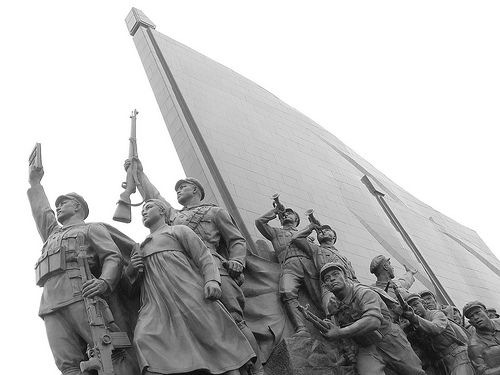North Korea has attempted to introduce various economic reforms and policies to open up the economy since the year 2000. The reforms have only been partially successful, more due to faulty implementation than bad intent. Many North Korean technocrats do not understand basic economic principles, and they failed to grasp the fact that undertaking this kind of economic reform has complex consequences.
At the same time, the North Korean leadership is paranoid about with the impact of reform on its hold on power. As long as North Korea remains in a hostile relationship with much of the world, diversion of large amounts of scarce national resources to the military is inevitable. But an overt lack of balance between North Korea’s economic and military sectors is dangerous.
On the military front, the chief risk of an unbalanced military economy that threatens its neighbor to the south with a ‘sea of fire’ is exacerbated by North Korea’s nuclearisation.
On the economic front, over more than a decade, the communist government has failed to provide enough food for its people. Many ordinary people in North Korea have discovered, either via hearsay or via increasing outside contacts, that life in North Korea compares unfavorably with life across the border. North Korean officials also know well that frequent stealing and extortion of farm produce by the North’s hungry soldiers is hurting the income of farmers and that rampant corruption amidst of widespread hunger is contributing to erode the legitimacy of the North leadership.
Despite tight controls, people are continuing to eke out a meager living by selling and buying scarce and necessary goods in non-official markets. This accords with common sense. People should be able to generate food and income that the state is no longer able to provide. Even bureaucrats, knowing that the state is in short supply of resources to reward their zeal, are increasingly looking to the secondary market for opportunities. But although this market is necessary in the face of widespread famine, its secondary, unregulated nature breeds illegality. The economy is rife with corruption, and problems of bribery and human trafficking continue to plague the north.
What, then, is the right way forward, for North Korea and the international community?
As the execution of Park Nam-ki shows, the North’s leadership can use its power to fix upon a scapegoat for Its own policy failure(s). But in the end the North’s leadership will have to take collective responsibility. It is only by doing this that it can avoid implosion.
As to the world community, the leadership of the North Korean political regime is in flux, and the political and economic relationship between North Korea and South Korea is uncertain. The key point is that surrounding nations must attempt to keep something of a power balance between nations in the region. Regardless of whether Korea breaks down economically or blows up militarily, this contingency preparation is urgently needed.
Eui-Gak Hwang is Research Professor of the International Centre for the Study of East Asian Development (ICSEAD), Kitakyushu, Japan.

